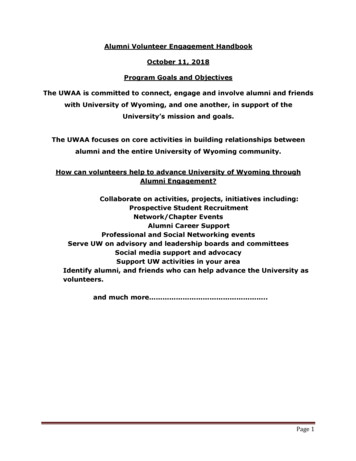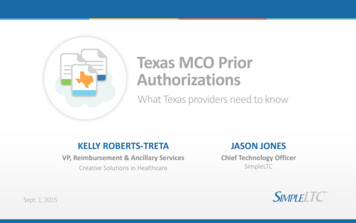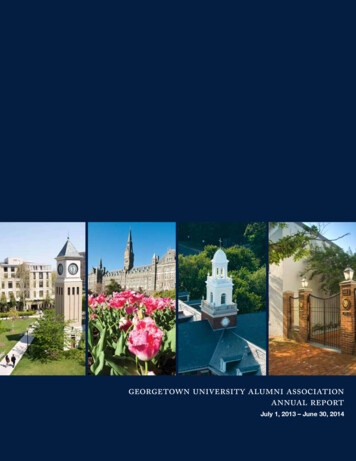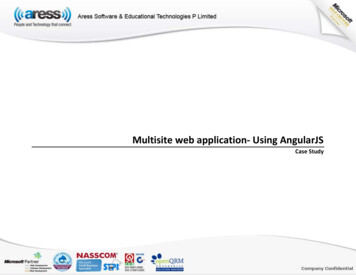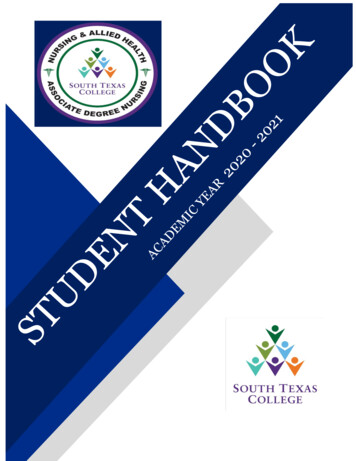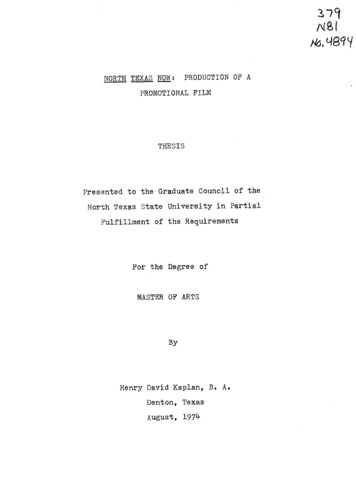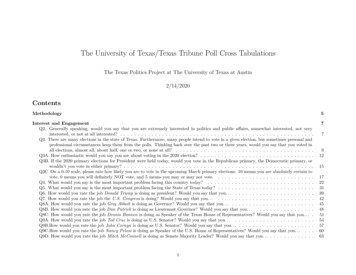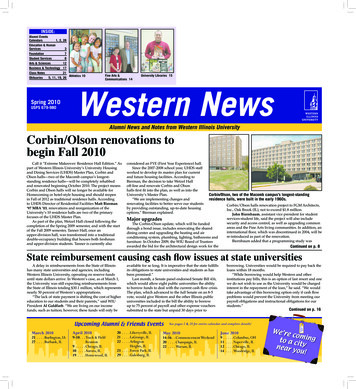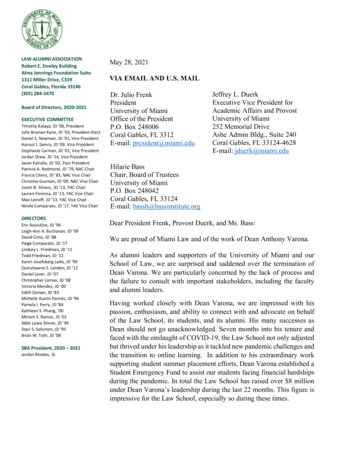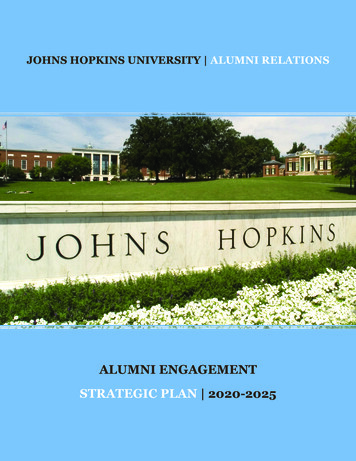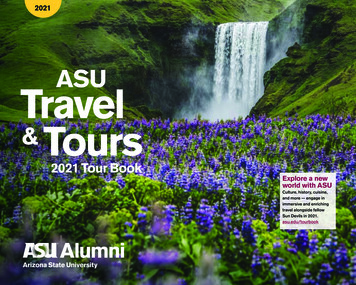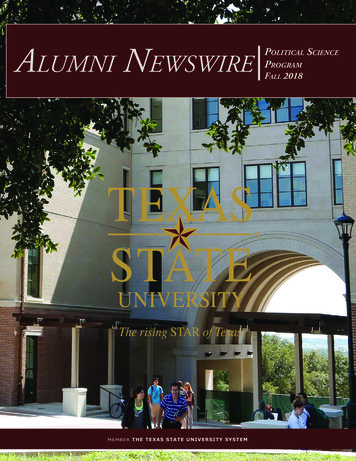
Transcription
Alumni Newswire MEMBER THE TEXAS STATE UNIVERSITY SYSTEMPolitical ScienceProgramFall 2018
Political Science Program2018 Alumni NightPi Sigma Alpha Awards Galai
2018 Texas State UniversityNEWSWIRECONTENTSPOLITICAL SCIENCE PROGRAMADMINISTRATIONDISCOURSEINDEMOCRACY59MODEL UN&MODEL OASCHAIRKenneth Grasso, Ph.D.ASSOCIATE CHAIR,UNDERGRADUATE ADVISORSherri Mora, Ph.D.MA PROGRAM DIRECTORCecilia Castillo, Ph.D.8SUPPORTINGWOMEN INPOLITICAL SCIENCEALUMNIHIGHLIGHTS19ADDITIONAL CONTENTMessage From The Chair 1Upcoming Discourse in Democracy EventsOFFICE MANAGERDenise BjerkeMA PROGRAMADMINISTRATIVE ASSISTANTDodie WeidnerSTUDENT DEVELOPMENTSPECIALISTJamie Falconnier7Students Represent Texas State 11facebook.com/txstate.polisciInklings 13Pi Sigma Alpha 14Awards, Scholarships, and Graduates 15Texas State Universitywww.polisci.txstate.eduInternships 17ii
Political Science ProgramMESSAGE FROM THE CHAIRFrom humble beginnings as a few courses in “Civics” and later“Government” in the university’s Department of History, todayTexas State’s Political Science Department has grown to becomethe home to almost 600 graduate and undergraduate political science majors, and more than 25 full-time faculty. (This doesn’t evencount the more than 300 undergraduate and graduate studentsmajoring in Public Administration and Legal Studies who also callthe department home, and the 15 full-time faculty members whoteach in these programs).As an alumnus of our department, please take a look to see whatour faculty and students are up to these days. As you’ll see, the pastyear has been a busy time for us. On the faculty side, among manyother things, in keeping with our longstanding commitment toteaching excellence, five of our faculty members were recognizedas “favorite professors” by Texas State’s Alfred H. Nolle Chapter ofthe Alpha Chi National Honor Society, one was recognized by theCollege of Liberal Arts for his scholarship, one published a bookwith Johns Hopkins University Press, another published a newedition of an award-winning textbook, one was awarded a prestigious Fellowship in Political Thought & Constitutionalism at theKinder Institute on Constitutional Democracy at the Universityof Missouri, and one was elected to San Marcos, TX City Council. This doesn’t take into account the many articles, essays, andbook chapters they’ve published in the course of the academic year, invited talks they’ve delivered, papers they’ve presented!As far as our students are concerned, they’ve been busy as well. Among many other things, our students have traveled to theHarvard Model United Nations in Boston, MA and Southern Regional Model United Nations in Charlotte, NC; dominatedthe awards at the 21st Annual Eugene Scassa Mock Organization of American States (ESMOAS); organized a conference onvoter engagement; in the fall traveled to Texas A&M and in the spring to UT-Austin to participate in seminars sponsored bythe Texas Network for the Study of Public Issues; organized a new student group, Supporting Women in Political Science;presented at Texas State’s 9th annual International Research Conference for Graduate Students; and participated in the 63rdAnnual Student Conference on National Affairs at Texas A&M in College Station, TX.No account of what we’ve been up to here would be complete without a mention of our ongoing Discourse in Democracy(DiD) project. Still going strong after more than fifteen years, through lectures, panels, film showings, and other events, DiDconnects our students with the broader world of politics and political science, and helps them to engage with America’s ongoingcivil conversation. This past year’s DiD speakers included Admiral Bobby Inman (former Director of the National SecurityAgency and Deputy Director of the CIA and currently the Lyndon B. Johnson Centennial Chair in National Policy at theLBJ School of Public Affairs at the University of Texas), Cornell University’s Dr. Gustavo Flores-Macias, SUNY Albany’s Dr.Stephen Wasby, Dr. Tonya Golash-Boza of the University of California-Merced, Dr. Bradley Watson of St. Vincent College,and Dr. James R. Stoner, Hermann Moyse, Jr. Professor of Political Science at Louisiana State.The 2018-2019 DiD speakers will include Dr. Keith Whittington (William Nelson Cromwell Professor of Politics at PrincetonUniversity), Dr. Bruce Frohnen (The Ella and Ernest Fisher Chair at Ohio Northern University’s College of Law), Dr. Daron1
2018 Texas State UniversityShaw (University Distinguished Teaching Professor at the University of Texas at Austin), and Dr. Wilfred McClay (G.T. andLibby Blankenship Chair in the History of Liberty at the University of Oklahoma). Other events will include our traditionalelection night party, our ongoing film series, our annual “Meet the Professors” gathering and our annual Alumni Night.And no account would be complete without a mention of the Model Organization of American States project. Over the pastdecade, our MOAS team has emerged as one of the strongest in the nation, and in 2018, as in 2016 and 2017, the departmentwill be hosting the 22nd Annual Eugene Scassa Model Organization of American States Competition. ESMOAS will bringover 200 students and faculty from the southwestern United States and northern Mexico to campus for a simulation of theOrganization of American States (in which teams of students compete in a Model UN style format, representing one of the 35countries of the Western Hemisphere), an Inter-American Court of Human Rights Moot Court Competition (in which pairsof students compete in a moot court setting, presenting and defending human rights cases in front of a panel of judges), andan academic conference. If you’re interested in helping to support our MOAS team, please visit the Step Up For State page onthe Texas State website.Please stay in touch! You can reach out to us at politicalscience@txstate.edu with any questions you may have about the department or update your alumni information, and make sure to check out the Discourse in Democracy schedule on page 7 ofthis newsletter.Dr. Kenneth GrassoChairDepartment of Political ScienceTexas State UniversityTEXAS STATE UNIVERSITY SYSTEMBOARD OF REGENTSThe Texas State University System is governed by a nine-member Board of Regents appointed by the governor and confirmedby the Senate. Board terms are staggered so that three members of the Board are appointed every two years during the legislative session. A non-voting student regent is also appointed annually to the board for a one-year term.Rossanna Salazar, ChairmanWilliam F. Scott, Vice ChairmanDavid Montagne, RegentVernon Reaser III, RegentCharlie Amato, RegentAlan Tinsley, RegentDr. Veronica Muzquiz Edwards, RegentGarry Crain, RegentDr. Jaime R. Garza, RegentLeanna Mouton, Student Regent2
Political Science ProgramPOLITICAL SCIENCE PROGRAM FACULTYBen Arnold, M.A.Senior LecturerRick Henderson, M.A.Senior LecturerCecilia Castillo, Ph.D.Assistant ProfessorDirector, Masters in Political ScienceRodolfo Hernandez, Ph.D.Senior LecturerAreas of Interest: Electoral Politics, the Judiciary,International InstitutionsAreas of Interest: Political Theory, American PoliticalThought, Literature and PoliticsPaul DeHart, Ph.D.Associate ProfessorAreas of Interest: Political Philosophy, American Political Thought, JurisprudenceBill DeSoto, Ph.D.Associate ProfessorAreas of Interest: Local Government, Public PolicyThomas E. Doyle, II, Ph.D.Associate ProfessorAreas of Interest: International Security, NuclearEthics, International EthicsMichael Faber, Ph.D.Assistant ProfessorAreas of Interest: American Presidency, American Political Development, Early American Political ThoughtBlake Farrar, M.A.LecturerAreas of Interest: American Politics, Political Behavior, Elections and MediaRobert Gorman, Ph.D.ProfessorAreas of Interest: International Law and Organizations, International Humanitarian and Refugee Affairs,Ethics and CitizenshipKenneth Grasso, Ph.D.ProfessorChairAreas of Interest: Political Theory, Religion andPolitics, American Political Culture3Areas of Interest: American Politics, Texas Politics,Local PoliticsAreas of Interest: Political Theory, American PoliticalThought, Religion and PoliticsTheodore Hindson, Ph.D.Associate ProfessorAreas of Interest: Russian Politics, British Politics,World PoliticsDon Inbody, Ph.D.Senior LecturerDirector, Discourse in DemocracyAreas of Interest: American Politics, Voting, Civil-Military RelationsPaul Kens, J.D., Ph.D.ProfessorAreas of Interest: Constitutional Law and Theory,U.S. Constitutional Development, Judicial PoliticsSherri Mora, Ph.D.Senior LecturerAssociate ChairUndergraduate Program AdvisorAreas of Interest: American Government, EducationPolicy, FinanceCynthia Opheim, Ph.D.ProfessorAreas of Interest: American Politics, Legislative Process, American State PoliticsIonut C. Popescu, Ph.D.Assistant ProfessorAreas of Interest: International Security, Strategyand Conflict, American Foreign Policy and NationalSecurityOmar Sanchez, Ph.D.Associate ProfessorAreas of Interest: Comparative Politics, Latin American politics, Democratization, Quality of DemocracyIssues, Economic Reform, Political Economy of Development, Party SystemsJennifer Lamm, Ph.D.LecturerThomas Varacalli, Ph.D.LecturerGraduate Assistant CoordinatorAreas of Interest: American Politics and PoliticalDevelopment, Constitutional Law, ImmigrationAreas of Interest: Political Theory, American PoliticalThought, Constitutional LawArnold Leder, Ph.D.Associate ProfessorKenneth Ward, J.D., Ph.D.ProfessorAreas of Interest: Middle Eastern Politics, Terrorism,the HolocaustAreas of Interest: Constitutional Law and Theory,Judicial Politics, Political TheoryAshleen Menchaca-Bagnulo, Ph.D.Assistant ProfessorJeremy Wells, Ph.D.Senior LecturerAreas of Interest: Political Theory, American PoliticalThought, Constitutional Law & TheoryAreas of Interest: International Relations, Interstateand Civil Conflict, Foreign AidEd Mihalkanin, Ph.D.Associate ProfessorHyun Yun, Ph.D.Associate ProfessorAreas of Interest: International Relations, U.S. Diplomacy, U.S. Latin-American RelationsAreas of Interest: Political Communication, PublicOpinion, Elections and Media
2018 Texas State UniversityOCT. 3-4#StepUpForStateHelp support student programs!The Department of Political Science will again be participating in this university-widedonation program. Donations to our program will go directly to helping travel costsfor students participating in the MOAS and MUN programs.For more information about Step Up for State, please visithttps://donate.txstate.edu/stepup.4
Political Science ProgramDISCOURSE IN DEMOCRACYDr. Popescu and students atMeet the Professors NightDiscourse in Democracy (DiD) kicked off the 2017-2018 academic year on September 12th with the annual “Meet theProfessors” Night. The event gave students an opportunityto meet faculty members, hear about their backgrounds andspecializations, and learn about the courses they teach. Thestudents also heard about upcoming departmental events andthe various student groups associated with the department.The presentations were followed by a social gathering thatgave students a chance to talk informally with faculty overpizza.5dled around Dr. Stoner to extend the conversation for anadditional hour of conversation.In the course of his day on campus, Dr. Stoner also spoketo 80 AP government students from New Braunfels HighSchool and held two seminars for Texas State political sciencestudents.On September 19th, Dr. James R. Stoner, Hermann Moyse,Jr. Professor of Political Science at Louisiana State Universityand author of several books including Common Law Liberty:Rethinking American Constitutionalism and Common Law and Liberal Theory: Coke, Hobbes and the Origins of American Constitutionalism, visited campus to deliver DiD’s annual ConstitutionDay lecture. His talk, entitled “The Positive Freedom of Speech,”focused on the purposes which the constitutional guaranteeof free speech was intended to serve and addressed the question of whether government had a legitimate role in regulating speech in order to ensure rational discourse in public life.Admiral Bobby Inman, former Director of the National Security Agency and Deputy Director of the CIA and currentlythe Lyndon B. Johnson Centennial Chair in National Policy at the LBJ School of Public Affairs at the University ofTexas, held a two-hour seminar for faculty and students onOctober 4th. He discussed his own career in the intelligencecommunity as well as sharing stories about his involvement insome of the more important events in recent American history. The topics he addressed included North Korea, Russianinvolvement in the 2016 U.S. elections, and the Foreign Intelligence Surveillance Court. Additionally, he shared some observations about the four presidents he served under (Ford,Carter, Reagan, GHW Bush) and how they dealt with national security issues and policies.His lecture was attended by more than 350 students, facultyand administrators including Texas State University PresidentDr. Denise Trauth and Provost Dr. Gene Bourgeois. Following the subsequent Q&A session, a number of students hud-Dr. Gustavo Flores-Macias, a political economist and experton Latin America and Associate Professor of Governmentat Cornell University visited campus on October 25th to talkabout “Mexico’s 2018 election and Future of the Institutional Revolu-
2018 Texas State Universitytionary Party (PRI),” the leading political party in Mexico. Thelecture focused on why the PRI has persisted through theyears despite the democratization of Mexican politics thatbegan in 2000. His books include After Neoliberalism: The Leftand Economic Reforms in Latin America.Dr. Stephen WasbyDiD’s spring semester began with the annual Alumni Night,held on January 25, 2018. This year, three graduates sharedtheir post-graduation experiences with our majors: JudePrather (BA POSI ’08), the Veteran Services Officer for HaysCounty; Vanessa Cortez Tanner (BPA ’14), a consultant forBerry Communications, a political consulting firm based inAustin; and Holly Doyle (BA POSI ‘17), a Community Outreach Specialist at Planned Parenthood of Greater Texas.The discussion focused on finding work after graduation andwas followed by a Q&A session with the students. The nightwas wrapped up with a reception where students had the opportunity to engage directly with Jude, Vanessa, and Holly.On March 1st, DiD hosted a talk by Dr. Tonya Golash-Bozaof the University of California-Merced whose books includeImmigration Nation and Deported: Immigrant Policing, DisposableLabor and Global Capitalism. 75 students and faculty membersattended her lecture on “Mass Deportation and Mass Incarceration in a time of Crisis” which explores the role of corpoDr. Stephen Wasby (SUNY-Albany) visited campus on Feb- rate profits, economic recession, politicization of race andruary 22nd and 23rd. Dr. Wasby’s books include The Supreme gender, and fears of terrorism in facilitating the recent trendCourt in the Federal Judicial System and Desegregation from Brown to of mass deportation. The talk was co-sponsored by the UniAlexander: An Exploration of Supreme Court Strategies. A crowd versity Lectures Committee and the Center for Diversity andof over 100 students and faculty members attended his lec- Gender Studies.ture on “The Presidency and the Law” which focused on the period from the Johnson administration to the present. He also The final speaker of the year, Dr. Bradley Watson of St.conducted seminars for undergraduate and graduate students Vincent College in Latrobe, Pennsylvania, visited campuson “Group-based Litigation” and “The U. S. Courts of Appeals,” on April 26th. Dr. Watson, whose books include Living Conas well as meeting with students informally for lunch and din- stitution, Dying Faith: Progressivism and the New Science of Jurisprudence and Civil Rights and the Paradox of Liberal Democracy,ner.lectured on “Living Constitutionalism and the Decline of the Ruleof Law.” Attended by 60 students and faculty members, hisReturning graduates share theirtalk addressed recent trends in constitutional interpretationexperiences on Alumni Nightand their implications for the future of American democracy.In addition to the lecture, he led a seminar for twenty students and faculty members, and joined students and facultyfor lunch and dinner. Dr. Watson’s lecture was funded by agrant from the Association for the Study of Free Institutions.DiD wishes to thank the Hatton W. Sumners Foundation, the TexasBar Foundation, the Association for the Study of Free Institutions,the University Lectures Committee, and the Jack C. Miller Center forTeaching America’s Founding Principles and History for their generoussupport of our activities.6
Political Science ProgramDISCOURSE IN DEMOCRACYFILM SERIESThe fall 2017 DiD Film Series featured “13th”, a Netflix Original documentary by directorAva DuVernay, director of “Selma” (2014). This documentary identifies systemic racismthroughout the U.S. justice and legal system. The documentary explores how while the13th Amendment abolished slavery, forms of slavery still exist deeply embedded within theprison system. 75 students, faculty and community members attended the November 8thshowing in the Alkek Theater. The event was part of the university’s 2017-2018 CommonExperience project on “The Search for Justice: Our Response to Crime in the 21st Century.”The spring installment took place on March 21st. The event showcased the 2009 Academy Awardnominated documentary, “The Most Dangerous Man in America: Daniel Ellsberg and the PentagonPapers.” Attended by more than 200 students and faculty members, the documentary examinedDaniel Ellsberg’s role in collecting information on the progress of the Vietnam War, the smugglingof secret documents from the Rand Corporation and the long protracted federal trials that not onlyput him in peril, but became a symbol for freedom of the press in America.All Discourse in Democracy film events are coordinated by Professor Rick Henderson.FALL 2018 UPCOMING EVENTSConstitution Day LectureSeptember 20, 2018Alkek Theater 7:30 PMGuest Speaker: Keith Whittington,Princeton University“Why We Should Value Campus FreeSpeech”Guest LectureOctober 4, 2018Alkek Theater 7:30 PMBruce Frohnen, Ohio NorthernUniversity“Constitutional Morality and the Rise ofQuasi-Law”Guest LectureOctober TBD, 2018Daron Shaw, University of Texas“Elections 2018”For information on all Discourse in Democracy events, please contact Dr. Don Inbody at di12@txstate.edu.Follow DiD on Twitter @TeamDiscourse.7
2018 Texas State UniversitySUPPORTING WOMEN INPOLITICAL SCIENCE (SWIPS)Justice Melissa Goodwin andSWIPS membersSWIPS members attendinginaugural meetingOn September 20, 2017 Texas State students met for theinaugural meeting of the new student-led club, SupportingWomen in Political Science (SWIPS). SWIPS is a bi-partisan group intended to help women in political science atTexas State find opportunities for support, mentorship,and networking in their discipline. During this first meeting, they discussed the vision of the organization and theirplans for the future. SWIPS member Morgan Morrowsaid, “I’m aspiring to be a lawyer and have decided to joinSWIPS because it provides support for women in a majorand career field that is traditionally dominated by men. Ibelieve SWIPS will provide a way for women in the fieldof political science to come together to aid one another bysharing stories and experiences.”During the fall semester, Jennifer Walker Gates, an immigration lawyer from the firm of Walker Gates Vela PLLC(http://walkergatesvela.com), came to speak to SWIPSstudents about immigration law and her experiences as animmigration lawyer. She fielded questions about her careerin law and her experience as a woman and mother in bothschool and the practice of law. In the spring, SWIPS continued their speaker series by hosting Justice Melissa Goodwin of the Texas 3rd Court of Appeals. Justice Goodwinspoke to the group on February 28th about her educationalbackground and professional training before becoming aTexas District Court Judge and Justice of the Peace forTravis County. She currently serves on the Texas ThirdCourt of Appeals. The talk was followed by a lively Q&Ain which Justice Goodwin answered student’s questionsranging from law school, practice as an attorney, becomingan elected official, the legacy of sex-based discriminationin the workplace, to juggling work and family obligations.You can visit the SWIPS Facebook page at “Supporting Women in Political Science at Texas State University” or Twitter @SWIPS TXST.Justice Melissa Goodwinspeaks with SWIPSFor additional information or future events, pleasecontact Dr. Jennifer Lamm at jel127@txstate.edu orDr. Ashleen Manchaca-Bagnulo ata k230@txstate.edu.8
Political Science ProgramMODEL UNITED NATIONSandMODEL ORGANIZATION OFAMERICAN STATESStudents participating inSRMUNThe Model Organization of American States (MOAS) andModel United Nations (MUN) are academic organizationsthrough which students learn about parliamentary debate, howdiplomacy institutions operate, and current issues around theglobe and in the hemisphere by participating in competitionsand simulations such as the Harvard National Model UnitedNations.In these competitions, students are expected to represent theirassigned nation’s interests and display diplomatic proficiency.In doing so, using parliamentary procedure, students argue forand against resolutions that are developed by student competitors in mock sessions. Thus, to succeed, students must learninternational relations theory, current global issues or in thecase of OAS the politics of the Western Hemisphere (especially that of Latin America), effective diplomatic techniques,and parliamentary procedure. Participants will also becomecomfortable with public speaking, and conduct research on thetopics presented at the competitions.November 9-11, 2017, the Department of Political Sciencehosted the 21st Annual Eugene Scassa Mock Organization ofAmerican States (ESMOAS) Summit of the Americas CompeKeynote speaker at ESMOAS,Ambassador Oliver del Cidtition and Conference. The event brought some 225 studentsand faculty members to campus from across the southwesternUnited States and northern Mexico for a competition simulating meetings of the Organization of American States, an academic conference on Inter-American Relations, and a modelInter-American Court of Human Rights competition.Representing the nations of Brazil, Panama, and Costa Rica,the 15 member Texas State student delegation won numerousawards. Among the highlights, Ashton Thomas was selected asthe Distinguished Ambassador (2nd place Overall for an individual award) and Lindsey Bentley received the OutstandingDiplomacy award for her contributions.November 1-3, 2018Texas State University, San Marcos9The keynote address was delivered by Oliver del Cid, Belize’sambassador to Mexico, on Friday evening, November 10th.Ambassador del Cid is a Texas State alumnus, graduating with
2018 Texas State UniversityESMOAS Awards and HonorsAshton Thomas – Distinguished Ambassador (2nd place Overall for anindividual award)Lindsey Bentley – Outstanding DiplomacyConnor Clegg – President for the 21st Annual ESMOASBianca Beronio – Parliamentarian for the 21st Annual ESMOASCatherine Wicker – Chair / Executive Secretariat for Integral DevelopmentBrittlin Richardson – Rapporteur / Executive Secretariat for IntegralDevelopmentClaire Whisler – Student Advisory CommitteeBrian Delgado – Distinguished Resolution (2nd place in Committee) /General CommitteeLucy Stanley – Distinguished Resolution (2nd place in Committee) /Secretariat for Multidimensional SecurityCassandra Macias – Distinguished Resolution (2nd place in Committee) /Secretariat for Strengthening DemocracyChristian Sears – Outstanding Resolution (1st place in Committee) /Secretariat for Multidimensional Security / Parliamentarian for the 22ndESMOAS at Texas State in 2018Cody Enderli – Outstanding Resolution (1st place in Committee) /Secretariat for Strengthening DemocracyJohn Garcia – Outstanding Orator (1st place in Committee) /Inter-American Commission on Human Rights / Distinguished LegalTeam (2nd place in Committee)Ethan Strickland – Distinguished Legal Team (2nd place in Committee) /a Bachelor of Arts in Political Science. Throughout his foreignservice career which has involved working with countries suchas Guatemala, Jamaica, and Mexico, he has maintained a strongrelationship with Texas State and returns to campus regularly. Ambassador del Cid received Texas State’s “DistinguishedAlumni Award” from President Trauth in 2015.Six Texas State undergraduates -- Brian Delgado, DeanteDowdell, Kaylie Hidalgo, Natalie Hernandez, Haley Schmidt,and Bradley Taylor -- traveled to Charlotte, North CarolinaApril 11-14, 2018 to participate in the Southern Regional Model United Nations. The SRMUN competition consisted of 500Inter-American Commission on Human RightsThe Political Science Department’s Model United Nations(MUN) program sent 13 students -- Darian Bear, ConnorClegg, Brian Delgado, Sheldon Galipp, John Garcia, JuliaHuerta, Kayli Lord, Brandon Milligan, Lucy Stanley, JewelTapp, Ashton Thomas, Claire Whisler, and Catherine Wicker-- to participate in the Harvard National Model United Nations (HNMUN) in Boston, Massachusetts from February14-18, 2018. The HNMUN competition featured 2,700 student competitors from 280 institutions (including Columbia,Students participating inBrown, Yale, and the United States Military Academy at West SRMUNPoint) and 67 different countries. Participating students wereable to debate a host of important global issues, ranging fromthe rights of linguistic minorities to global access to financial competitors, representing 70 institutions, including Clemsonservices.University, the University of North Carolina, and the University of Central Florida. Participating students discussed a hostof global issues, ranging from access to clean water to globaldebt issues.You can visit the MOAS and MUN Facebook page at“TxstateMOASandMUN”.Students participating inHNMUNFor additional information or future events, please contact Professor Ben Arnold at ca17@txstate.edu.10
Political Science ProgramSTUDENTS REPRESENT TXSTATEDr. Bagnulo and students attendingTNSPI’s spring seminar.Texas State University repeated its successful representation atthe Student Conference on National Affairs (SCONA) atTexas A&M University this past February. The student delegation was comprised of John Flores, Christine Gian, and IdaraObong E. Ben-Edet. For three days, they networked withpolitical and military officials and students from other campuses. Under the guidance of seasoned experts, participantsjoined assigned groups to discuss and craft policy proposalsaddressing today’s top global and national issues. The processpushes students to think quickly and creatively. “I lost countof how many cups of coffee I drank in order to figure how towrite a policy proposal,” Gian observed. A panel of expertsthen evaluated the proposals.Students participatingin SCONAGian’s group researched refugee crises in Europe, a topic thatdrew on her personal experiences: “I didn’t realize my personalstories growing up with refugees, and my dad being a refugee,would help the framework of the policy proposal.” Flores andhis group placed second runner-up for best policy proposalfor their work on the North Korean nuclear threat. “It wasa great experience,” Flores noted, “I learned so much.” BenEdet’s group covered intelligence sharing among governmentsand won the award for best policy proposal.rea, Congressman Louie Gohmert, and General Frank Grass.SCONA seeks to bring together a wide range of perspectiveson issues of national importance.Four graduate students from the department presented theirresearch at Texas State’s 9th annual International ResearchConference for Graduate Students on November 7-8, 2017,including Master of Arts in Political Science student Amy Perry who presented her research on “Factors in Rejection ofPresidential Nominees to the U.S. Supreme Court.”In October, seven Texas State students -- Samuel Barr, Sabra Woodward, Jordan Mandujano, Todd McDonald, AdamHenley, Cody Wallace, and Ronald Clark -- attended the Texas Network for the Study of Public Issues’ (TNSPI) fallseminar, an initiative of the American Public Philosophy Institute (APPI), at Texas A&M University. The students attended lecture and discussion sessions exploring classic and contemporary writings on marriage and family, including excerptsfrom the works of Locke, Mill, and Tocqueville. Speakersincluded Christopher Wolfe (University of Dallas) and MarkRegnerus (UT-Austin), author of Cheap Sex: The Transformationof Men, Marriage, and Monogamy.In April, eight Texas State Students attended TNSPI’s springseminar on freedom of speech at the University of Texas atAustin. Samuel Barr, Ana De Loza, Adam Henley, Ezekiel Loeseke, Jordan Mandujano, Evan Olszewski, Evan Spake, andSabra Woodward heard a keynote address delivered by Dr.James Stoner of Louisiana State University on “Free Speech andthe Natural Law” as well as a panel discussion featuring JeffreyAbramson (UT Law), James Sullivan (former Solicitor GeneralAttendees heard from Dr. Joseph Han, who defected from of Texas), and Naomi Reed (UT’s Institute for Urban PoliNorth Korea in 1999. Flores remarked that Han’s account of cy Research and Analysis). Students also participated in small“his journey from North Korean physicist to professor of nu- group discussions about speech laws and hate speech with stuclear physics at Texas A&M was compelling.” Other speakers dents from several other Texas universities.included Mr. Kim Hyung-gil, Consul General of South Ko-11
2018 Texas State UniversityHOSTED BY THEPOLITICAL SCIENCE PROGRAMOn March 2nd and 3rd, the department
“Government” in the university’s Department of History, today Texas State’s Political Science Department has grown to become the home to almost 600 graduate and undergraduate political sci - . American Politics, Texas Politics, Local Politics Rodolfo Hernandez, Ph.D. Senior Lecture
